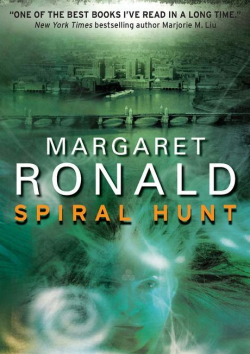You all know that I don’t often give out quotes, usually because I rarely have time to read. Several months ago, though—during a truly busy time—a novel came my way that I planned to set aside for some weekend break. Instead, the day I received it, I happened to glance at the first page—and got totally hooked. I devoured that book from cover to cover, and it was fantastic, one of a kind.
The book is called THE SPIRAL HUNT, and the author is Margaret Ronald. It’s difficult for me to describe the novel—except to say that it may be one of the best new urban fantasy series out there, right now.
Here’s the official description:
Some people have the Sight. Genevieve Scelan has the Scent. They call her “Hound,” and with her unique supernatural sense Evie can track nearly anything—lost keys, vanished family heirlooms . . . even missing people. And though she knows to stay out of the magical undercurrent that runs beneath Boston’s historic streets, a midnight phone call from a long-vanished lover will destroy the careful boundaries she has drawn. Now, to pay a years-old debt, Evie must venture into the shadowy world that lies between myth and reality, where she will find betrayal, conspiracies, and revelations that will shatter all she believes about herself and the city she claims as home.
When the Hunt is on, the Hound must run . . .
Margaret has been kind enough to be my guest at the blog, and she’s also giving away a signed copy of her book. Just post in the comments to be entered (check out her cool question at the end of the post). We’ll hold the drawing on Thursday.

When I first came to Boston, I got lost all the time. Some of this springs from my total lack of directional sense, but more of it was the change in environment: I grew up in a small town, where most of the streets were laid out on a grid following the compass points. Boston’s not like that. The standard joke is that the city’s streets are based on the cowpaths that were crossed the place in colonial times, and thus they don’t have any more sense than a wandering bovine. There’s not much truth behind the story, but it persists because, after half an hour driving through a warren of one-way streets trying to find parking, it feels right.
The thing is, there are a few places in Boston where the streets run along a grid, where I could usually find my way without getting too lost. Both the Back Bay and South Boston are laid out with streets that are either numbered or alphabetically named (Arlington, Berkeley, Clarendon…). Streets that made sense, to my city-stunned mind. The reason they’re like that is that both parts of the city are built on fill: neither one was actual land when the colonists came over. (The Back Bay was apparently one big tidal muckpool with its own interesting aroma on hot days.) Both neighborhoods were planned out and filled in, their streets laid down by fiat rather than consensus.
I remember learning this for the first time and, because my imagination was latching on to weird stuff at the time, wondering what else could have been put down there, under the streets . . .
Maybe that was the trigger for the setting of Spiral Hunt. Or maybe it was the result of getting lost so many times. I found myself trying to piece together some fantastical underpinnings for Boston. I’ve always had a weak spot for stories about magic under the surface of a city, whether that’s literally underneath, as in the London of Neverwhere or Un Lun Dun, or metaphorically, as in the Las Vegas of Last Call or the Moscow of Night Watch or the Seattle of our host’s The Iron Hunt. Somehow the idea of great events taking place beneath one’s feet—or just around the corner, gone when we next look—really catches my imagination. Spiral Hunt plays a little with that; I named the magical side of Boston the “undercurrent” for a reason.
There’s a hint of that in the term “urban fantasy.” Even though the definition of it shifts depending on who’s talking (our world? another world? hidden magic? integral magic?), the presence of the city itself seems to be taken for granted. I’m still not sure why that is, or if I’m just missing out on the suburban or rural fantasies. (Most small-town fantasy that I’ve read tends to be closer to the horror side of things, often along the lines of the small-town-implodes pattern from Stephen King.) And then there are the imagined cities from outside the urban fantasy genre: Lankhmar, New Crobuzon, and that inestimable pearl (or other variety of mollusk secretion) of cities, Ankh-Morpork.
What makes cities so much fun to write or read about? What are some of your favorite cities in fantasy? What cities haven’t yet been touched—and which would you like to see with a fantastic underside?